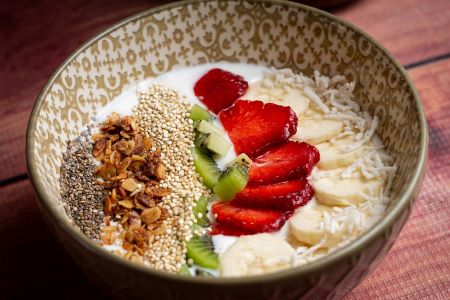How To Keep Your Gut Health In Check When Travelling
The excitement of a well-earned holiday means new countries to explore, local cuisines to savour, and stunning sights to see. Travel and holidays often mean relaxation, creating new memories, having fun, and stress-free adventures. But how often do stomach upsets or discomfort spoil our enjoyment? No one wants to battle constipation, bloating, abdominal pain, traveller’s fatigue, or diarrhoea on holiday. And we certainly don’t want to bring back nasty souvenirs like food poisoning or infections. Research (1) shows travel can heighten antimicrobial resistance genes and promote harmful bacteria linked to infections and inflammation. An unhappy gut doesn’t bode well for happy travels!
Understanding The Role Of The Gut When Travelling
Our gut flora is a complex ecosystem of trillions of microorganisms and plays a crucial role in our overall wellbeing by keeping a favourable balance of friendly to harmful bacteria.
While letting loose on holiday often means indulging in everything (hello hotel buffets!), overeating can stress our gut.
Additionally, we may tend to eat more processed foods when away from home, reducing the fibre our system needs. Disruptions such as changes in time zones, spending hours on aeroplanes, irregular eating times and shift in food choices can also disrupt this delicate balance which can compromise our immune defences and increase susceptibility to infections and digestive issues.
So, how should we take care of our gut & ensure our travels run smoothly?
Here are some ways to keep your gut happy & your travels enjoyable…
Hydration
Staying hydrated is key. Flights, especially long-haul, can contribute to dehydration and fatigue. Dehydration can worsen digestive problems, so keep a refillable water bottle with you throughout your trip. Avoid excessive consumption of alcohol and caffeinated drinks, especially during travel days which can dehydrate you.

Tip: Always consider if the water is safe to drink at your destination & how the food has been prepared to avoid bacterial infections or food poisoning.
Opt for bottled water if needed and be mindful about where you eat- ensure fresh foods like salads are washed in clean filtered water and try to avoid ice in drinks if you are unsure about the water used to make them.
Keep A Check On Your Fibre Intake
Constipation is a common complaint for travellers, often accompanied by bloating and abdominal discomfort. That’s why incorporating fibre into your daily routine is essential. It helps to keep the bad bacteria in our gut at bay and supports keeping our bowel movements regular!

Fibre rich foods essentially include plenty of diverse plant foods, fruit and vegetables, whole grains, nuts and seeds. Prebiotic fibre is especially good as it helps to stimulate good bacteria in our gut (think bananas, apples, onions, garlic, oats, nuts).
Tip: Keep a small bag of mixed nuts & seeds (such as chia, sunflower, pumpkin, flax) to snack on or add to yogurts, cereals, or salads.
Keep Your Body Moving To Keep Your Gut Moving
Getting some daily movement will help keep your gut moving and help you adjust to the new time zone. This could be as simple as walking (easy to do when exploring new places!) or swimming a few laps in the hotel pool. This helps to get the digestive system moving and can help you to feel more energised.
Sleep & Adjusting to New Time Zones
Travel fatigue is real! Flying, irregular sleep and eating times, can disrupt our body’s natural rhythm and in turn stress our gut. Research (2) shows that disturbances to our circadian rhythm can negatively impact gut health. Adapting gradually to the destination’s time zone can support a healthier travel experience. Regulate your rhythm by trying to stick to consistent sleep times, and enjoy a short nap post a long flight to recharge and allow you to continue enjoying your trip.
Tip: Try & resist the temptation to stay up late & sleeping excessively during waking hours- exposing yourself to natural light during the day & fresh air will help to regulate your circadian rhythm.
Eat locally!
Eating locally when travelling not only can give you a deeper understanding and appreciation of the local culture, it also often exposes you to a range of beneficial microbes unique to the region, which can enrich your gut microbiome.
Local foods are typically fresher, less processed, & richer in prebiotic fibres that support diverse gut bacteria.
Each plant-based food feeds different gut bacteria, offering a great opportunity to enhance your gut health. Ask locals for restaurant tips and explore local food markets!
Pack In The Probiotics
A combination of feeling travel fatigue, exposure to unfamiliar microbes, and eating out of your normal pattern (more cheese, alcohol, processed foods) can hit your immune system and ultimately your gut.

Protein and probiotic rich foods such as Greek yogurt can be a great healthy breakfast or snack choice and is a great source of live beneficial bacteria to support a balanced gut microbiome by helping to maintain a healthy balance of beneficial bacteria. Other probiotic rich foods include Kefir, kimchi, sauerkraut and Kombucha.
Tip: You may also want to consider a probiotic supplement as this can help support & facilitate a healthy balance of gut bacteria, promoting beneficial bacteria over harmful ones which can defend against harmful microbes encountered in new environments during travel, reducing the risk of infections and travel-related issues such as diarrhoea (3).
Opt for a quality shelf-stable probiotic that doesn’t require refrigeration and start taking it a couple of weeks before your trip to boost your gut’s good bacteria before the trip itself. It is however, always best to consult with a healthcare professional such as a nutritional therapist before starting any new supplement regime to make sure its appropriate for your
individual health needs.
Enjoy Yourself!

Travelling is an adventure that brings memorable moments and new experiences, and maintaining gut health doesn’t have to be a chore. By staying hydrated, eating nourishing foods, keeping active, and getting good sleep, you can help support your gut to remain happy and balanced!
Sources
1. Zhao, Y. Li, C. Wu, K. et al. (2024). ‘Exploring the Impact of Short Term Travel on Gut Microbiota and Probiotic Bacteria Mediated Stability’, Biomedicines, 12(7), p:1378.
2. Voigt, R.M. Forsyth, C.B. Green, S.J. et al. (2016). ‘Circadian Rhythm and the Gut Microbiome’, International Review of Neurobiology,131, pp:193-205.
3. Bae, J.M. (2018). ‘Prophylactic efficacy of probiotics on travelers’ diarrhea: an adaptive meta-analysis of randomized controlled trials’, Epidemiology and Health,40:e2018043.
Main – Image by นิธิ วีระสันติ from Pixabay






